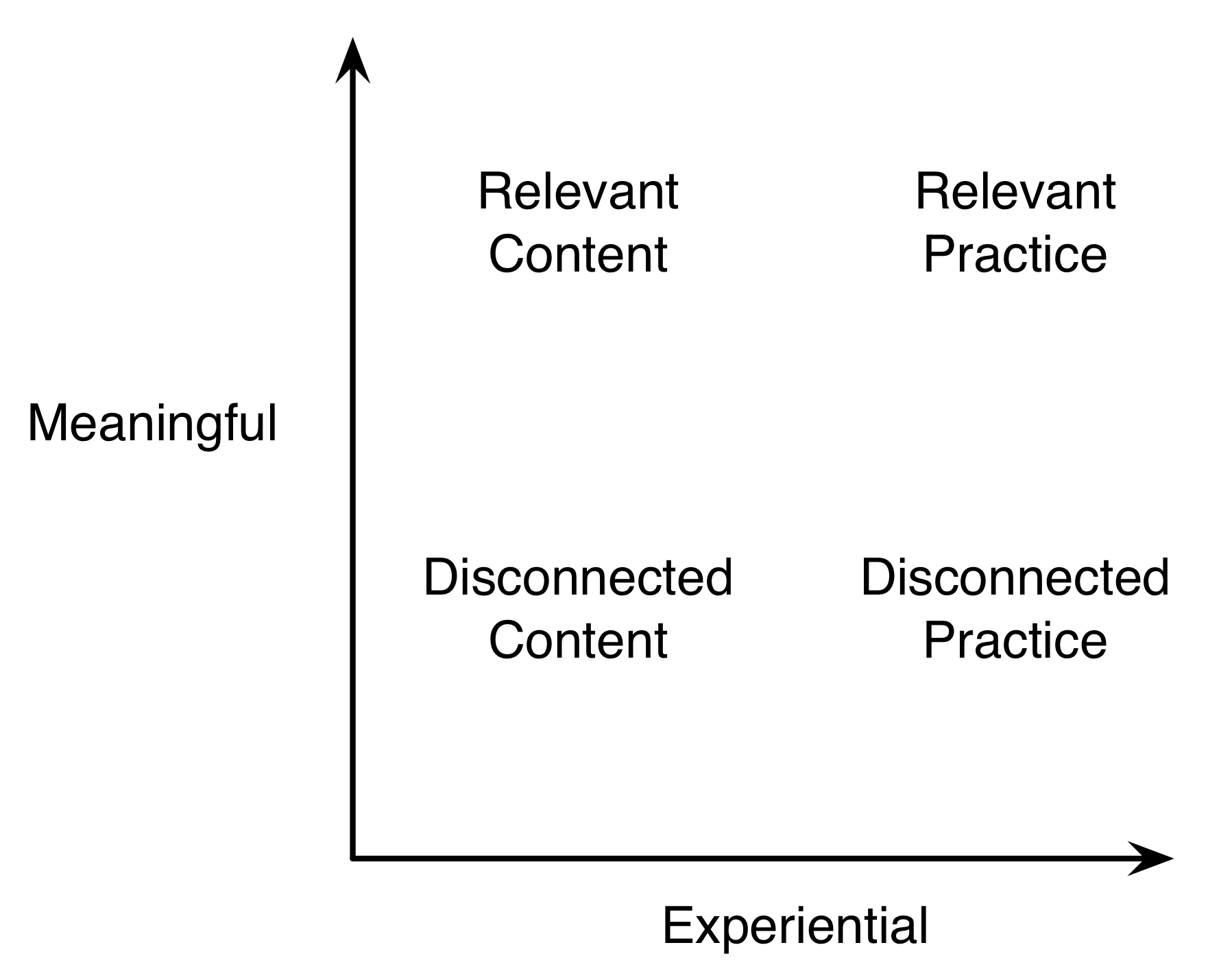At lunch last week with my colleague Jay Cross, we riffed on the most important word was for learning in the organization. I chose ‘meaningful’, he went with ‘experiential’. They’re both important, but I thought I’d tease them out a bit.
 I take meaningful in two senses: what you’re doing (read: learning) is directly related to what your goals are, and it’s something you care about. So, for example, in designing serious games, you want to focus on key skills, not on irrelevant material. And, to work as engagingly as possible, you also are also choosing a context that the learner cares about. Taking something relatively abstract like coaching, you could be providing support for developing a coaching model (rather than using an existing one), or you could be figuring out how to help a person separate out person from behavior (commenting on the latter is to be preferred). Similarly, it could be in the context of being a better accountant (uninteresting except to accountants), or it could be for sports (which might be of interest to a broader segment). The point is to be focusing on relevant skills in interesting contexts.
I take meaningful in two senses: what you’re doing (read: learning) is directly related to what your goals are, and it’s something you care about. So, for example, in designing serious games, you want to focus on key skills, not on irrelevant material. And, to work as engagingly as possible, you also are also choosing a context that the learner cares about. Taking something relatively abstract like coaching, you could be providing support for developing a coaching model (rather than using an existing one), or you could be figuring out how to help a person separate out person from behavior (commenting on the latter is to be preferred). Similarly, it could be in the context of being a better accountant (uninteresting except to accountants), or it could be for sports (which might be of interest to a broader segment). The point is to be focusing on relevant skills in interesting contexts.
Now, I take experiential to have some overlap, but to be addressing two senses as well: both the context you are learning in, and the nature of the learning experience. That is, you can be learning away from work, or in the work process, the latter being more ‘experiential’. And you can be learning by doing in either context, learning ‘how’, as opposed to learning ‘about’. I think there’s overlap here in being contextually relevant , but separate in the sense of personally interesting and the learning being applied.
I mapped it out, with lack of experiential and meaningful being disconnected content (which I see far too much of in workplace learning), or where we start providing knowledge how (not about) to be meaningful, providing activity-based learning to be experiential, and of course the ultimate being the intersection of both.
I’m sure Jay would argue that if it’s experiential, learning through real work experience, it’s inherently meaningful. And I’d argue that if it’s suitably meaningful, it naturally has to be experiential. Yet overall I’m happy take either one or both versus neither!
Thanks for the read Clark – I really enjoy your blogs.
One word for me that comes to mind – and particularly resonates in terms of adult learning within commercially driven organisations, is ‘action’. There’s a quote from Herbert Spencer which has always stuck with me, and which I think is said in many ways by different gurus in the ‘thinking professions’: ‘The great aim of education is not knowledge but action.’ (Herbert Spencer)or … ‘Without knowledge action is useless and knowledge without action is futile.’ Abu Bakr
I guess this places ‘action’ as the end game – but when we start with the end in mind, it’s also the catalyst. If learning’s the means to gain the knowledge – or discover it – if it’s not driven by a need to use it in some shape or form for the good of yourself or others, it’s useless and is not in the best interests of yourself, those around you and your organisation. It’s the big motivator – how will I use what I’m learning tomorrow or better yet, today? It has to have an action to drive the experiential process or be meaningful.
Thanks for helping me think about it!
Brenden from The Learning Hook – eLearning specialists.